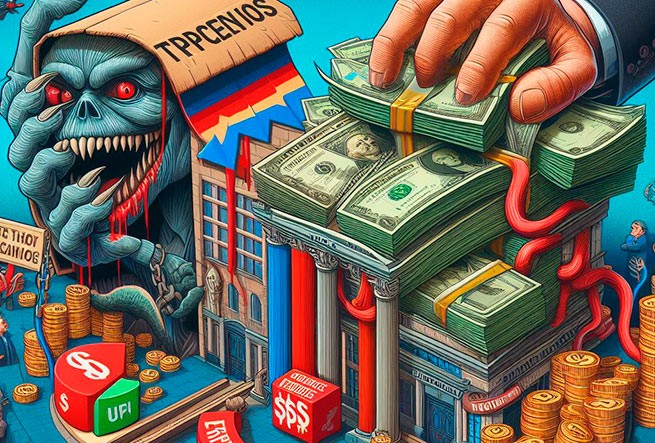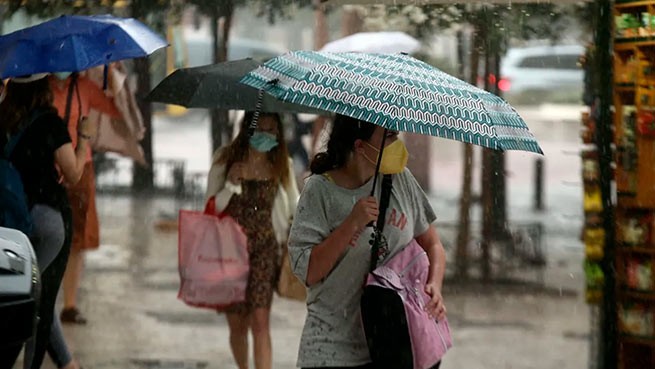While the Greek government and paid experts talk about “economic spring” (heyday), an informal discussion is taking place among Greek citizens, “why is this not visible in their real lives”.
That is, a situation called “Don’t believe your eyes.” And how can one be optimistic when, for example, some basic products in Greece – such as eggs, butter, baby products – are sold at prices similar to those in countries where workers have salary more than twice the average (England, France), etc.
Research based on statistics, analysis by economists and scientific organizations has recorded 14 sources of inflation.
5 of them constantly fuel inflation and are permanent pathologies of the Greek economy and market:
- The desire of a business to increase profits.
- Dependence of domestic production and consumption on imports.
- Pandemic.
- Energy and climate crisis.
- Low wages.
Here is the composition of the “explosive cocktail”.
High cost of food remains a very big problem, as Greece ranks second worst in the eurozone in terms of GDP per capita. At the same time, no matter what measures the government took, they did not lead to either a reduction or a reversal of speculation (the desire for profit). This is a fact evidenced by the fines issued to large companies.
Alas, often a fact usually has two sides of the “same coin”. And in cases where there is a huge contradiction, explanations are not easy. Firstly, for inexplicable reasons, many economists around the world focus almost obsessively on the “core” of inflation, which does not include energy and food prices. According to the latest data, inflation in Greece is at 3.5%, and the increase in food prices (oils, fruits, detergents, etc.) may exceed 10%, or even 20%.
Regardless of measures to support low-income citizens or government intervention in the trade market, the main conclusion of economists whom the Economic Post spoke to is that If real wages do not increase, then demand for food and basic necessities (depending on sales) will continue to drive up prices.
Official data ELSTATprocessed by the “OT” website, show that food prices increased by exactly 30% from May 2021 to November 2023, which is an example of the situation prevailing in the country.

Inflation… greed
Domestic institutional organizations such as the Bank of Greece, as well as foreign ones, refer to the risk inflation “greed”and that’s because high profits further fuel rising prices in an environment of “gallorifying high prices.” It is necessary to strengthen control over speculation, and enterprises profit margins should be limited where possible.
In the short term, it is necessary to strengthen control by competent control mechanisms and the Competition Commission to avoid the phenomenon of profiteering (unfair profiteering practices).
In the medium and long term it is necessary increase competition in product markets by eliminating all kinds of regulatory obstacles to competition in order to facilitate the entry of new companies into the market. As for raising wages, this “topic” is under pressure due to the narrowness of the labor market, experts say.
Eight eternal market problems
According to economists and market executives, international food prices will remain at a high levelhowever, inflation is more noticeable in Greece, mainly due to low wages.

Reasons for the high cost
- Operating costs that compete with the primary sector.
- Small and few production units in livestock and agriculture.
- Little competition, small size of the Greek economy.
- Insufficient control, especially regarding price increases in the supply chain. Due to the large number of intermediaries, this leads to speculation.
- Relatively high VAT on some basic products.
- Climatic conditions.
- Distortions in markets for goods and services that inhibit productivity and competitiveness.
- Pandemic, imports, energy and climate crisis.
An intense inflation wave emerged after the end of the pandemic and quarantine.
Why did this happen? Because economic recovery after quarantine provoked a revaluation of products, and therefore prices never returned to pre-2020 levels. The growth of business profit shares in the first year of the pandemic and their subsequent dynamics were influenced by the features and circumstances that developed during the pandemic and then the energy crisis.
The subsequent maintenance of the share of corporate profits at high levels can be explained by a number of factors, such as high demand exceeding limited supply in certain sectors of the economy (food, industrial goods), accumulation of savings by the population during a period of economic growth. The pandemic, which intensified the dynamics of consumer demand, prevailed in a strong inflationary environment.
In such conditions, according to economic studies (IOBE, Bank of Greece, etc.), there was a strong increase in resource prices (for example, the cost of imported energy), which further increased inflation, and possibly made it easier for businesses to transition to higher costs for consumers.
According to the analytical department of Alfa Bankrisks to rising inflation, such as geopolitical tensions, significant wage growth and the financial costs of extreme weather in the eurozone, will remain. Therefore, the government must continue to intervene. Investments can help reduce price pressures. In this direction, the “relaxation” of monetary policy may in the subsequent period serve as reinforcement for increasing the competitiveness of the economy.
The question also came into the field of discussion wage increase due to inflation.
According to official data, although companies in Greece increased their turnover in a number of sectors compared to 2021, investments increased, government bonds were modernized, growth rates stabilized at 2%, inflation stopped at 3.5% (from 10%). in 2022). The following paradox occurs: it is discovered gap between wages in Greece and Europe.
In 2013, the difference was 11,561 euros, that is, according to Eurostat, the average salary in Greece was 17,358 euros, and in EU – 28,919.
According to economic and social climate measurements, high growth rates did not affect the real economic situation of citizens, in contrast to the increase in the cost of basic goods. Despite improved performance and a decline in overall inflation, Greek workers earn some of the lowest wages in the eurozone, while prices on supermarket shelves have risen to the level of countries earning double or triple the wages of Greece.
In Greece, nominal wages fell in 2021 (-1.53%) and rose very slightly in 2022 (0.87%).
However decline in purchasing power was felt in 2021 and 2022: real wages decreased by 3.93% and 6.87% respectively! This suggests that price increases (inflation) were much higher than wage increases, resulting in a decrease in purchasing power.
At the same time, real wages in the euro area have grown steadily, with a slight fall in 2022 (-1.07%). The overall picture in the eurozone is much more positive than in Greece, with purchasing power remaining relatively stable or increasing.







More Stories
Reduced fees for POS transactions, limited bank fees
Easter 2024: more expensive than travel, more modest table
Tourism: how much money foreign visitors spent in Greece